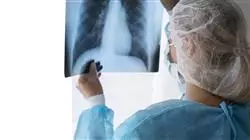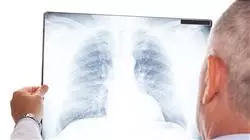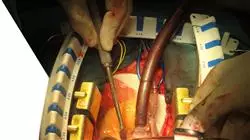University certificate
The world's largest faculty of medicine”
Why study at TECH?
This Hybrid professional master’s degree provides the most advanced and recent theoretical content on Thoracic Oncology complemented with a first class practical stay"

One of the great challenges for Thoracic Oncology professionals is the early detection of lung cancer. A disease that every year claims numerous lives and in which different research groups work in a coordinated manner throughout the world to obtain optimal results and implement the most effective treatments and diagnostic systems.
A reality that is progressing little by little, especially thanks to the work of study and the progress achieved thanks to new technologies. The digital sector has enabled the creation of devices that facilitate the monitoring of the patient's disease, the collection of large amounts of data and decision making based on Artificial Intelligence. In this sense, TECH has considered it propitious to create a university degree that responds to specialists who wish to improve their knowledge in Thoracic Oncology.
To this end, it has designed a program consisting of a 100% online theoretical framework that students can access comfortably from any electronic device with an internet connection and at any time of the day. A content that will allow you to delve into the new clinical trials in the era of personalized oncology, localized studies of non-small cell carcinoma or clinical management in a thoracic tumor unit applying the latest technological advances.
A phase that concludes with a 100% practical stage in a prestigious hospital center in the field of Thoracic Oncology. An ideal scenario, where students will be tutored by an expert in this field, with a deep knowledge of the latest advances in the
management of oncology patients. A unique and intensive 3-week experience, surrounded by a cutting-edge healthcare environment.
This way, TECH offers professionals a flexible degree, which allows the completion of an educational process that is fully compatible with the most demanding work and personal responsibilities.
Access with this university degree to the latest clinical trials in the era of personalized oncology"
This Hybrid professional master’s degree in Thoracic Oncology the most complete and up-to-date scientific program on the market. The most important features include:
- Development of more than 100 clinical cases presented by professional oncologists with expertise in cancer
- The graphic, schematic, and practical contents with which they are created, provide scientific and practical information on the disciplines that are essential for professional practice
- Diagnostic-therapeutic developments on assessment, diagnosis, and intervention in Thoracic Oncology
- Comprehensive systematized action plans for the main pathologies in the Intensive Care Medicine Unit
- An algorithm-based interactive learning system for decision-making in the clinical situations presented throughout the course
- With a special emphasis on evidence-based medicine and research methodologies in Thoracic Oncology
- All of this will be complemented by theoretical lessons, questions to the expert, debate forums on controversial topics, and individual reflection assignments
- Content that is accessible from any fixed or portable device with an Internet connection
- In addition, you will be able to carry out a clinical internship in one of the best hospital centers
Thanks to the Relearning system you will be able to progressively advance through the online syllabus and reduce the long hours of study"
In this proposed Master's program, of a professionalizing nature and hybrid learning modality, the program is aimed at upgrading medical professionals who perform their functions in oncology units, and who require a high level of qualification. The contents are based on the latest scientific evidence, and oriented in a didactic way to integrate theoretical knowledge in medical practice and the theoretical-practical elements will facilitate the upgrading of knowledge and allow decision making in patient management.
Thanks to its multimedia content elaborated with the latest educational technology, they will allow the medical professional to obtain a situated and contextual learning, that is to say, a simulated environment that will provide an immersive learning programmed to provide actual practice in real situations. This program is designed around Problem-Based Learning, whereby the professional must try to solve the different professional practice situations that arise throughout the program. For this purpose, the student will be assisted by an innovative interactive video system created by renowned experts.
This Semi in person Master will allow you to be up to date with the technological platforms for patient monitoring and control"

Get into the hand of the best specialists in the new treatments for malignant thymoma"
Teaching Planning
Thoracic Oncology uses the Relearningsystem, given its effectiveness, in all its programs. With this method, the professional will advance more easily through the syllabus and will be able to reduce the long hours of memorization. This way, they will be able to upgrade their diagnostic and therapeutic skills in Thoracic Oncology. To facilitate this upgrade, it also includes video summaries of each topic, in focusvideos, essential readings and clinical case studies. The culmination of this program will be a practical stay in a prestigious hospital center, where you will be able to test the latest procedures used by the best specialists in this area.

The multimedia didactic material will lead you to explore in a dynamic way the basics of treatment in Thoracic Oncology"
Module 1. Etiology, Prevention and Screening
1.1. Risk Factors and Prevention
1.1.1. Risk Factors
1.1.2. Lung Cancer and Other Respiratory Diseases (COPD, OSAHS)
1.1.3. Smoking Cessation
1.2. Solitary Pulmonary Nodule
1.2.1. Definition and Etiology. Estimation of Malignancy
1.2.2. Diagnostic Techniques in the Study of Solitary Pulmonary Nodules
1.2.3. Sequential Evaluation. Management Algorithm
1.3. Screening
1.3.1. Screening. Algorithm of Action
1.3.2. Implementation of Screening in the Healthcare System
Module 2. Translational Oncology
2.1. Molecular Biology
2.1.1. Molecular Mechanisms of Cancer
2.1.2. Tumor Immunology: Basis of Cancer Immunotherapy
2.1.3. Microenvironment Reprogramming in Lung Cancer
2.2. Translational Oncology
2.2.1. Understanding the New Technology: Next Generation Sequence (NGS) in Clinical Practice
2.2.2. Therapeutic Targets in NSCLC
2.2.3. Liquid Biopsies in NSCLC: The Future Is Here
2.2.4. Role of the Biobank in Clinical Research
Module 3. Diagnosis and Staging
3.1. Clinical Diagnosis. Serum Markers
3.1.1. Clinical diagnosis
3.1.2. Paraneoplastic Syndromes
3.1.3. Serum Markers
3.2. Imaging Techniques
3.2.1. Chest X-ray
3.2.2. Computed Tomography (CT)
3.2.3. Thoracic Ultrasound Scan
3.2.4. Magnetic Resonance Imaging (MRI) in the Assessment of Thoracic Tumors
3.2.5. Positron Emission Tomography (PET)
3.3. Cytohistological Studies
3.3.1. Classification and Anatomopathological Study
3.3.2. Non-Invasive Methods: Sputum Cytology
3.3.3. Non-Surgical Invasive Bronchoscopic Techniques: Standard Bronchoscopy, Ultrasound (EBUS-EUS), Electromagnetic Navigation and Others.
3.3.4. Transthoracic Non-Surgical Invasive Techniques: FNA, CNB, Thoracentesis and Pleural Biopsy
3.3.5. The Role of the Interventional Pathologist in the Diagnosis of Advanced Stage Lung Cancer
3.3.6. Invasive Staging in Lung Cancer
3.4. Functional and Staging Assessment
3.4.1. Preoperative Study of Surgical Risk
3.4.2. The Eighth Edition of TNM Classification of Lung Cancer
Module 4. Basis of Treatment in Thoracic Oncology
4.1. Basis and Experience of Surgical Treatment
4.1.1. Video-Assisted Thoracic Surgery. General Aspects
4.1.2. Robotic Surgery in the Treatment of Lung Cancer and Other Thoracic Tumors
4.1.3. Approach Routes to the Thorax
4.1.4. Lobectomy in the Treatment of Thoracic Tumors. Indications and Technique
4.1.5. Minor Resections in the Treatment of Thoracic Tumors
4.1.6. Pneumonectomy
4.1.7. Bronchoplastic Resections
4.1.8. Angioplastic Resections
4.1.9. Tracheal and Carinal Resection in Lung Cancer and Tracheal Tumors
4.1.10. Lymphadenectomy
4.2. Basis and Experience of Surgical Treatment
4.2.1. Evolution of Radiotherapy Treatment in Thoracic Tumors: from 3D-conformal radiotherapy to IMRT/VMAT
4.2.2. Stereotactic Radiotherapy
4.2.3. Pulmonary Brachytherapy
4.2.4. Proton Therapy for Locally Advanced Disease
4.3. Clinical trials in the Era of Personalized Oncology
4.3.1. Clinical Trials: Definitions, Examples, and Interpretation of the Literature
4.3.2. How to Design a Clinical Trial in Lung Cancer
4.3.3. Real World Data: Studies: Generating Knowledge
Module 5. Localized and Locally Advanced Stage Non-Small Cell Lung Carcinoma
5.1. Early-stage NSCLC (I-II)
5.1.1. Surgical Algorithm: Technique Selection
5.1.2. Non-Surgical Algorithm: Stereotactic Radiotherapy (SRT)
5.1.3. Current Best Practice for Adjuvant Radiotherapy
5.1.4. Current Best Practice for Adjuvant Chemotherapy
5.2. NSCLC in Advanced Stage (IIIA-IIIB)
5.2.1. Management of Stage IIIA NSCLC
5.2.2. Management of Stage IIIB NSCLC
5.2.3. Radical Radiotherapy in Stage III NSCLC
5.2.4. Concurrent and Sequential Chemotherapy Options in Stage III NSCLC
5.2.5. Toxicity of Radiochemotherapy
5.3. Tumor Pancoast
5.3.1. Diagnosis and Evaluation of Upper Lobe Tumors
5.3.2. Surgical Approach to Sulcus Tumors
5.3.3. Multidisciplinary Management of Upper Lobe Tumors
Module 6. Disseminated Stage Non-Small Cell Lung Carcinoma
6.1. NSCLC in Metastatic Stage. Targeted Therapy in the Treatment of NSCLC
6.1.1. Differentiation between the Treatment of Squamous Carcinoma and Adenocarcinoma of the Lung
6.1.2. Therapeutic Algorithm for NSCLC
6.2. Angiogenic and Targeted Therapy in the Treatment of NSCLC
6.2.1. Angiogenic Therapies in the Management of NSCLC
6.2.2. Targeted Therapy for EGFR-Positive Advanced Disease
6.2.3. Rebiopsy Recommendations After Progression to EGFR-TKIs
6.2.4. Management of EGFR-Resistant Disease
6.2.5. EML4 / ALK, ROS-1: Therapeutic Implications
6.2.6. Mechanisms of Resistance to ALK Inhibitors
6.2.7. Potential and Progress in KRAS, HER2, BRAF, PI3K, MET, TRK and RET Selection
6.3. Immunotherapy and Lung Cancer
6.3.1. PDL1 Are PDL1 Tests Interchangeable?
6.3.2. Clinical Experience and Current Recommendations for Immunotherapy
6.3.3. Immunotherapy in Patients with PD-L1-Negative NSCLC
6.3.4. Immunotherapy Beyond Immune-Control Inhibitors
6.3.5. The Role of Immunotherapy in Small Cell Lung Cancer and Other Thoracic Tumors
6.3.6. Monitoring and Management of Immune-Related Adverse Events
6.4. Oligometastatic Disease
6.4.1. Management of Oligometastatic Disease
6.4.2. Role of Surgery in Oligometastatic Disease
6.4.3. Stereotactic Radiotherapy in Extracranial Oligometastatic Disease
6.4.4. Fractionated Stereotactic Radiotherapy in Oligometastatic Brain Tumors
Module 7. Microcytic Carcinoma of the Lung and Neuroendocrine Tumors
7.1. Microcytic Carcinoma of the Lung
7.1.1. Multidisciplinary Management of Localized Disease
7.1.2. Role of Radiotherapy in Microcytic Lung Carcinoma of the Lung
7.1.3. Management of Disseminated Disease
7.1.4. Prophylactic Cranial Radiotherapy (PCR) in Microcytic Lung Carcinoma of the Lung
7.2. Neuroendocrine Tumors of the Lung
7.2.1. Molecular biology approach to low- and intermediate-grade neuroendocrine lung tumors.
7.2.2. Clinical Management Algorithm for Bronchial Carcinoid Tumors
7.2.3. Surgical Treatment for Pulmonary Neuroendocrine Tumors
Module 8. Tumors of the Pleura, Mediastinum and Thoracic Wall
8.1. Malignant Mesothelioma
8.1.1. Role of Surgery in Malignant Mesothelioma and Other Pleural Tumors
8.1.2. Role of Radiotherapy in Malignant Mesothelioma
8.1.3. Advanced Malignant Mesothelioma Treatment
8.2. Mediastinal Tumors
8.2.1. Prognostic and Predictive Value of the Pathologic Classification of Thymomas
8.2.2. Role of Surgery in the Treatment of Mediastinal Tumors
8.2.3. Role of Radiotherapy in Thymoma
8.2.4. Multidisciplinary Approach in Advanced Thymoma
8.2.5. New Treatments for Malignant Thymoma
8.3. Thoracic Wall Tumors
8.3.1. Clinic and Diagnosis of Primitive Thoracic Wall Tumors
8.3.2. Surgical Treatment for Primitive Thoracic Wall Tumors
8.4. Treatment of Pulmonary Metastases from Other Tumors
8.4.1. Indications for Surgical Treatment of Pulmonary Metastases from Other Tumors
8.4.2. Surgical Technique in the Treatment of Pulmonary Metastases from Other Tumors
8.4.3. Fractionated Stereotactic Radiotherapy of Pulmonary Metastases from Other Tumors
8.5. Relapses and Second Tumors
8.5.1. Detection of Relapses and Second Tumors
8.5.2. Treatment of Relapses and Second Tumors
Module 9. Collaboration in the Management of Oncology Patients
9.1. Palliative Management
9.1.1. Palliative Care: from Pre-Oncology Assessment to End-of-Life Care
9.1.2. Informed Consent: Are We Really Informing Our Patients?
9.1.3. Palliative Management of Symptoms in Lung Cancer
9.1.4. Palliative Endoscopic Treatments
9.1.5. Palliative Surgical Treatment
9.1.6. Why do Lung Cancer Present to the Emergency Department and How Can Outcomes Be Improved?
9.2. Emergencies and Comorbidities
9.2.1. Palliative Radiotherapy in Brain Metastases, Spinal Cord Compression, Vena Cava Syndrome and Hemoptysis
9.2.2. Acute Management of the Patient with a Thoracic Tumor
9.2.3. Management of Respiratory Comorbidities
9.2.4. Management of Infectious Comorbidities
9.2.5. Management of Cardiovascular Comorbidities
9.2.6. Neurologic Comorbidity Management
9.2.7. Management of Endocrinological Comorbidities
9.2.8. Management of Nutritional Comorbidities
9.2.9. Lung Cancer in the Elderly
9.2.10. International Development Cooperation Outpatient Care of Patients with Thoracic Oncological Pathology
9.2.11. Prescription of Physical Exercise in the Oncologic Patient. Prehabilitation
Module 10. From Clinical Management to Networking
10.1. Clinical Management in a Thoracic Tumor Unit
10.1.1. Basis of Clinical Management
10.1.2. Members and Functions of a Multidisciplinary Team
10.1.3. Decision-Making in a Multidisciplinary Committee
10.2. Improving Networking
10.2.1. Technological Platforms for Patient Monitoring and Control
10.2.2. The Collaborative Online World
10.2.3. Decision support Systems in Oncology Based on Artificial Intelligence
10.2.4. Use of Big Data in Thoracic Oncology

You will see in this degree how Networking can improve diagnostic and therapeutic decisions in Oncology"
Hybrid Professional Master’s Degree in Thoracic Oncology
The Hybrid Professional Master's Degree in Thoracic Oncology is designed for those healthcare professionals who wish to specialize in the diagnosis and treatment of lung cancer, mesothelioma, esophageal cancer and other thoracic pathologies. This academic program is directed by a team of experts in the field of thoracic oncology, and has a blended methodology that allows students to participate in online classes and practical sessions upon completion. The curriculum covers fundamental topics such as the anatomy and physiology of the thoracic area, as well as the latest diagnostic techniques and treatments in thoracic oncology, including chemotherapy and biological therapies. There will also be a specialized module dedicated to surgical techniques and a detailed look at the latest trends in oncology research and treatment development.
Learn by doing with this blended master's degree
Students will also have the opportunity to learn hands-on, attending live clinical cases and working in real-world situations with patients in our advanced thoracic oncology lab. The Hybrid Professional Master's Degree in Thoracic Oncology is an excellent opportunity for those healthcare professionals who wish to expand their knowledge in this area, and improve their ability to diagnose, play a role in the treatment and monitoring of cancer patients in the thoracic area. In addition, this academic program will offer students the opportunity to establish new networks with other high level professionals, which will give them a significant advantage in their future career projection. At TECH we have online study tools to make your learning fascinating, audiovisual material, readings, and the best faculty in the world. You can take your classes if they are online, from anywhere in the world, do not think twice and make the decision.







